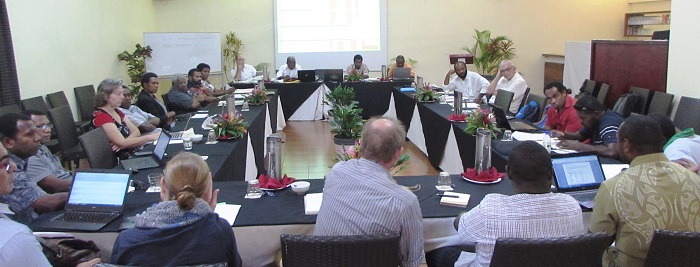Stakeholders agreed to Vanuatu's national action plan for copra/coconut, cocoa and sandalwood products at a National Green Export Review workshop, facilitated by UNCTAD, in Port Vila in August.
UNCTAD and the Ministry of Trade, Industries, Cooperatives, and Ni-Vanuatu Business organized a 2nd National Stakeholder Workshop on Vanuatu's National Green Export Review (NGER)) to develop recommendations and national action plans aimed at enhancing value-added and export capacity for copra/coconut, cocoa and sandalwood products in Port Vila, Vanuatu, on 6-7 August 2015. The meeting was held in the wake of Cyclone Pam which, in March 2015, virtually destroyed the Pacific island archipelago.
More than 40 participants attended the meeting including policymakers, farmers, agriculture and forestry experts, civil society and entrepreneurs in downstream industries that use copra/coconut, cocoa and sandalwood for the production of food products, essential oils, cosmetics and healthcare items, chocolate and handicrafts .

Speaking on behalf of the government of Vanuatu, Mary Navaika, Executive Officer, Ministry's Office of the Director-General, said that the workshop was timely and was aimed at advancing production and exports from Vanuatu, including through diversification into value-added copra/coconut, cocoa and sandalwood products. These three crops represent, she said, important economic sectors for the country.
Actions planned at the workshop could make valuable contributions to economic recovery that Vanuatu needs following Cyclone Pam, including by supplementing the government's Overarching Productive Sector Policy, Ms. Navaika added.
Vanuatu's NGER's team of experts - including Roy Pakoasongi, Jimmy Rantes and Noel Kalo - presented results of detailed studies of the copra/coconut, cocoa and sandalwood sectors, which included extensive consultations with producers in the field. The studies examined the main obstacles to enhancing levels of production and quality by farmers and expanding product diversification and supply volumes by downstream processors.
UNCTAD representatives Robert Hamwey and David Vivas Eugui serviced the meeting and provided examples of other NGERs - especially that which has been implemented in Ecuador.
The national action plan and related revisions elaborated at the workshop included a set of strategic lines and a list of specific actions to be implemented by the Vanuatu Government and other stakeholders over the next four-year period.
Among the most important recommendations included the need to:
- develop and implement a national seedling and replanting plan for coconut, cocoa and sandalwood plants;
- map cocoa plant genes;
- enhance training for farmers to improve productivity, pest control, harvesting, drying and packaging; make better use of coconut and cocoa waste to produce animal feed;
- reform the Vanuatu Commodities Market Board in order to make it more transparent, effective and useful to producers;
- and improve inter-island logistics, and advance collective marketing and branding.
Stakeholders called for donors to provide support needed to implement the plan, while UNCTAD representatives said it would continue to assist Vanuatu in ensuring its implementation
Mr. Rantes, Director of the Department of Industry and Commerce, closed the meeting thanking the representatives from UNCTAD and all of the national stakeholders for their contributions. He said that undertaking UNCTAD's National Green Export Review had been a highly valued and welcomed experience for Vanuatu and represented the first trade technical assistance project which had encouraged Vanuatu stakeholders to collectively analyse, assess and decide how to best support and promote their economy.
The full NGER report of Vanuatu will be published by UNCTAD later this year.


